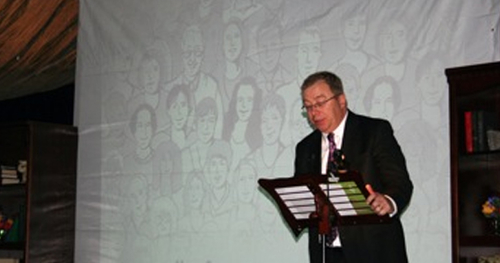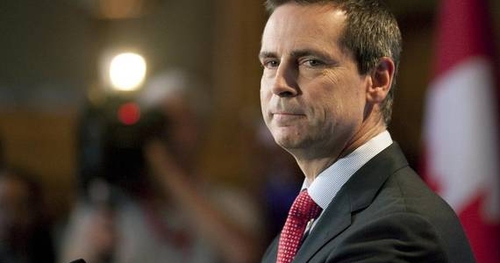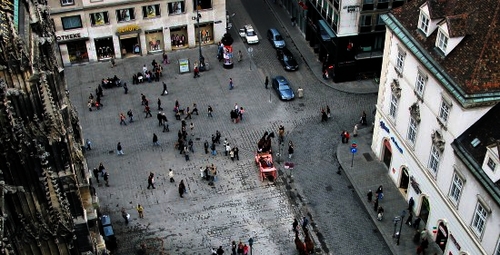
Survey finds faith is lacking for some
October 29, 2012

Alternative school grads more civic-minded: report
October 17, 2012

A Jerusalem Lost
In The Lost History of Christianity, Philip Jenkins makes an important, and humbling, observation: Just because Jesus' church will survive through all time does not mean it will thrive in all places, or at all times. Take, for instance, the North Korean capital of Pyongyang, known during the 1940s as the "Jerusalem of the East." In Escape from North Korea: The Untold Story of Asia's Underground Railroad (Encounter), Hudson Institute senior fellow Melanie Kirkpatrick labors to set the once-holy city's record straight. Banding together dozens of personal accounts of survivors who have fled North Korea, she tells a story of bravery, luck, disappointment, and death; of Christian activists and money-hungry brokers united behind a simple Mosaic invocation: Let my people go. Until the mid-1990s, there wasn't much to be gained by rushing the 880-mile border with China. With borders sealed and news of the outside world scarce, few ordinary North Koreans escaped. But when a crippling famine struck and a sudden Chinese prosperity beckoned, the trickle of refugees swelled to nearly half a million, its path smoothed by a relaxation of restrictive internal policies. Freedom, religious or otherwise, never entered their political vocabulary. Most fled simply out of hunger. Since the Korean War, fewer than 25,000 refugees have reached safety in South Korea. Yet North Korea receives less international attention than other failed states (notwithstanding accounts like this year's Escape from Camp 14: One Man's Remarkable Odyssey from North Korea to Freedom in the West). It does not have the status of an "Asian Darfur." Nor is the degradation of its people widely understood, even among South Koreans or Korean Americans. Culpability for this apathy and ignorance, argues Kirkpatrick, belongs at least partly to South Korean presidents Kim Dae-jung and Roh Moo-hyun, whose "Sunshine" policy (1998-2008) muted official criticisms of the Pyongyang regime in an effort to build good will. Activists and aid workers now call this period the "Lost Decade." Chinese intransigence makes the situation still worse. In contravention of international law, it remains official Chinese policy to hand North Korean refugees back to North Korea, where they face torture, incarceration, and possibly death. International options remain limited so long as China sustains its support for what, even by its own estimates, is an increasingly unstable and erratic government. Chinese interest is in stability. An Arab Spring in North Korea could unleash a flood of refugees and a civil war into which it would almost inevitably be drawn. China, then, prefers Pyongyang's instability and brutality to the unknown consequences of collapse. Thus is the Jerusalem of the East condemned to swelter under a largely invisible repression, its citizen-prisoners denied religious, economic, and associative freedoms. Escape from North Korea reaches us at a timely moment, marked by rising awareness of the regime's atrocities. For students of the Korean Peninsula, who know well the grim statistics, here is a rare book that puts human faces on the numbers, a lamentation over policies and duplicities that have haunted a people terribly divided.
September 27, 2012

Religious, private school graduates active, engaged citizens: study
September 26, 2012

Ray Pennings is interviewed by Michael Coren for Sun News
September 26, 2012

The Globe and Mail covers Cardus report on <I>Bill 13</I>
September 26, 2012

The Chicago Teachers’ Strike: A Just Conflict?
I’ll bet you a deep dish pizza that you have an opinion on the Chicago teachers’ strike. It’s like asking if the White Sox or the Cubs represent Chicago best. It’s hard to take a neutral stance on strikes, largely because they involve that which matters so much: work, wages and communities. But is there a way to put a normative framework on these events which might help us understand whether we should lend one side or another our support, and if so, why? Strikes and lockouts are actions taken by a given party (unions or employers, whether private or public) to enforce their will on the other party through the use of power to achieve a desired end. That power is exerted either through the withholding of labor (a strike, initiated by the union) or through the withholding of work (a lockout, initiated by the employer). Does that sound familiar? If you’re thinking this sounds remarkably like Clausewitz’s definition of war, “the continuation of politics by other means,” then you’re right. Strikes and lockouts are the continuation of labor negotiations by other means. Thinking of strikes in this way is a helpful tool, because, as with political disputes, it helps us place economic disputes into a context where questions about justice can be asked. I’ve found it helpful to transpose just war criteria onto into labor relations terms. Here is a short, albeit imperfect, list which I’ve found useful in thinking about strikes. Jus ad Inflictum Legitimate authority. A strike is only just if it is called by the union, within the laws of the land and within its own rules. Just cause. It must be waged in response to a particularly egregious proposal or action which will damage either party. Mere discomfort should not be enough. Right intention. It must be waged to right a wrong. Any strike which is waged with the intent of “getting back” at the other party is not just. Probability of success. A strike which is, on balance, unlikely to effect the change the union desires is not a just strike. Proportionality. A union must consider the effects that their strike will have on the wider public. Additionally, it’s helpful to note that there are rules which should govern action within strikes, themselves. The criteria fall under the category of Jus in Inflictum: Obedience to the laws of the land. Boundaries set out by political authorities must be respected, violence is strictly prohibited, and officers of the law are respected and obeyed if they instruct within the law. Proportionality. Labor must only withhold its labor. It may not engage in subterfuge or sabotage by other means in order to enforce its will. This, of course, does not preclude unions from mounting aggressive media or information campaigns. Discrimination. Labor should focus on enforcing its will on the employer. As with war, there will be “collateral damage” (i.e. traffic is slowed, some services withheld), but these should not be pursued intentionally. Some in the world of labor relations might suggest that such criteria set the bar too high—that strikes are not as damaging as war, and thus don’t require such extensive justification. But those who consider work to be a cooperative venture between labor and capital, and who view the preservation of social goodwill among workers and employers to be critical in the pursuit of both justice and good work will note that strikes, like war, are extremely damaging and often have long-term downsides. In each particular case, it is true that there are many, sometimes conflicting variables to consider, but, as Steven Garber notes, all justice this side of Eden and the Lord’s return is proximate. Under this framework, the Chicago teachers’ strike failed to meet three, and possibly four, of the jus ad inflictum criteria. First, there was no just cause: the strikes were clearly not in response to outrageous or particularly egregious proposals by the city. Likewise, there was no clear wrong which the union was trying to rectify, and even if there was, the strike action seemed to disproportionately and negatively affect vulnerable children, especially the children for whom school is a rare place of stability and peace. Finally, the Chicago courts were in the process of deciding whether or not the strike was actually lawful, as the teachers are forbidden by law to strike for “non-economic matters.” If they had lost this case, they would have failed to meet the “legitimate authority” clause. But, regardless of this, the strike happened and damage to both parties—and the public—has been done. And, whether a strike is justified or not, its conclusion demands, as Robert Joustra recently noted, a just peace. It is not enough to repay a wrong with another. The action must be aimed at a solution in which not only justice is achieved, but where justice in understood in the terms set out by the Book of Common Prayer, where “there is no strife among those who are engaged in the varied tasks of industry and commerce...That all, seek only what is right...[and] continue in brotherly union and concord, to their own well-being and the good of their fellow men.”
September 21, 2012

Doug Koop covers Cardus cities research for Rethink Urban
Doug Koop covers Cardus research on Cities for Rethink Urban. Leaning on the research in Living on the Streets he suggests that faith communities are already effective and important agents in renewing downtowns. Read the entire article here.
September 18, 2012

Defining justice in Libya and Egypt
“Justice will be done.†So said President Barack Obama after attacks in Libya resulted in four slain Americans, including Ambassador Chris Stevens. Obama has dispatched two warships and marines to Tripoli, even as the violence in Libya spreads to teetering Yemen, as crowds try to overrun the embassy in Cairo and, one fears, across more of the Middle East. Events are moving fast now, and we’re reassured in the midst of it that “justice will be done.†Will it? Can justice be done? It is easy in moments of grief and shock to mistake justice for retribution. The justice of the American president, in this case, looks comforting, right. Maybe it is those things. Hard power dispatched to far-off places to make right wrongs suffered by an enemy is a familiar American trope. But in those moments, it’s worth recalling Daniel Philpott’s urgent question in his important new book, Just and Unjust Peace. "In landscapes of past political injustice - piled and strewn with bones, rubble, and manifold wounds, emanating hatred, lamentation, revenge, resentment, and despair - what is the meaning of justice?†Philpott is a serious Catholic asking practical questions. His research covers places such as Bosnia, Rwanda, the Congo, Iraq, Afghanistan and more. Over and over he finds that an integral part of justice being done is reconciliation. Reconciliation is not the work that starts after the marines and the warships have done their jobs, but intrinsic from the start. It is a fundamental category of justice. This is a hard position to lobby after suffering violence. When Obama assures the American people that “justice will be done,†we are meant to feel he means retribution and restitution. The people who have perpetrated this act will be made responsible. Reconciliation certainly does not preclude restitution, but it does contextualize it. Justice demands that after the warships have raised anchor, the marines are lifted out and the drones buzz away, states, communities - maybe even radicals - need the possibility of building stable, flourishing societies. Reconciliation is not a discretionary luxury after withdrawal. It is incumbent on the justice of making war. But what kind of reconciliation can there be with people like Osama bin Laden’s onetime mentor, Muslim cleric Abdul Majid al-Zindani, who fomented an attack on the American embassy in Yemen, where protestors burned two vehicles, stripped and burned the American flag and replaced it with a banner proclaiming the Islamic faith? What peace can there be with those who hate so much? Answers range from the usual cosmopolitan navel gazing, asking why we are so hated, to a simple dismissal of reconciliation in this context. Many pundits over the last few days have pointed to the irresponsibility of making the incendiary amateur film that is the subject of many of the protests. It is true, of course, that such acts have responsibilities intrinsic to them. But it is a different thing from the making of such a film to storming embassies, or using the film as a pretext for a possibly pre-planned attack, killing diplomats and inciting violence. Justice also demands proportionality. The justice of war finally cedes that there may come times when there can be no peace, when war will be made, when dialogue and conversation will fail. But Philpott’s reminder is instructive as warships sail: justice cannot be done, cannot be finished, until humans flourish. It is a terrible thing that human flourishing may demand the making of war. But it is a necessary thing that the making of war never be left unfinished, as we have too long been in the habit of doing, of leaving an unjust peace. Justice will be done not only when the deaths of American diplomats have been avenged, but when a sustainable peace for human flourishing comes to unstable Libya, to teetering Yemen, to the worrying rhetoric of the Muslim Brotherhood in Egypt. In Philpott’s justice, we can then certainly agree with President Obama’s arresting invocation: “Justice will be done.
September 14, 2012
Media Contact
Daniel Proussalidis
Director of Communications
